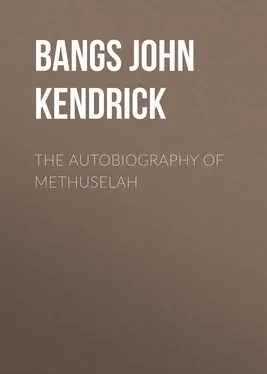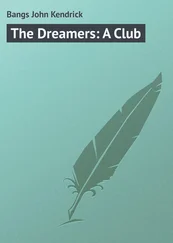John Bangs - The Autobiography of Methuselah
Здесь есть возможность читать онлайн «John Bangs - The Autobiography of Methuselah» — ознакомительный отрывок электронной книги совершенно бесплатно, а после прочтения отрывка купить полную версию. В некоторых случаях можно слушать аудио, скачать через торрент в формате fb2 и присутствует краткое содержание. Жанр: foreign_humor, Юмористические книги, foreign_antique, на английском языке. Описание произведения, (предисловие) а так же отзывы посетителей доступны на портале библиотеки ЛибКат.
- Название:The Autobiography of Methuselah
- Автор:
- Жанр:
- Год:неизвестен
- ISBN:нет данных
- Рейтинг книги:3 / 5. Голосов: 1
-
Избранное:Добавить в избранное
- Отзывы:
-
Ваша оценка:
- 60
- 1
- 2
- 3
- 4
- 5
The Autobiography of Methuselah: краткое содержание, описание и аннотация
Предлагаем к чтению аннотацию, описание, краткое содержание или предисловие (зависит от того, что написал сам автор книги «The Autobiography of Methuselah»). Если вы не нашли необходимую информацию о книге — напишите в комментариях, мы постараемся отыскать её.
The Autobiography of Methuselah — читать онлайн ознакомительный отрывок
Ниже представлен текст книги, разбитый по страницам. Система сохранения места последней прочитанной страницы, позволяет с удобством читать онлайн бесплатно книгу «The Autobiography of Methuselah», без необходимости каждый раз заново искать на чём Вы остановились. Поставьте закладку, и сможете в любой момент перейти на страницу, на которой закончили чтение.
Интервал:
Закладка:
"What's the use?" I heard him ask, warmly. "He'll get his name on plenty of I. O. U.'s on his own account before he leaves this glad little earth, without our giving him an autograph that is already on enough over-due paper to decorate every flat in Uncle Zib's model tenements."
The disputation continued with some acrimony for a week, until finally my father put his foot down.
"I'm tired of referring to him as IT," he blurted out one night. "We'll compromise, and name him after me and thee. He shall be called Me for me, and Thou for thee, Selah!"
And so it was that from that day forth I was known as Methouselah, since corrupted into Methuselah.
CHAPTER II
EARLY INFLUENCES
Boys remained boys in those old days very much longer than they do now. The smartness of children like my grandsons, Shem, Ham and Japhet, for instance, who at the age of two hundred and fifty arrogate to themselves all the knowledge of the universe, was comparatively unknown when I was a child. To begin with we were of a different breed from the boys of to-day, and life itself was more simple. We were surrounded with none of those luxuries which are characteristic of modern life, and we were in no haste to grow old by taking short cuts across the fields of time. We were content to remain youthful, and even childish, taking on ourselves none of the superiorities of age until we had attained to the years which are presumed to go with discretion. We did not think either arrogantly or otherwise that we knew more by intuition than our parents had been able to learn from experience, and, with a few possible exceptions, we none of us assumed that position of high authority in the family which is, I regret to say, generally assumed by the sons and daughters of the present. For myself, I was quite willing to admit, even on the day of my birth, that my father, in spite of certain obvious limitations, knew more than I; and that my mother in spite of the fact that she was a woman, was possessed, in a minor degree perhaps, but still indubitably possessed, of certain of the elementary qualities at least of human intelligence. As I recall my attitude towards my elders in those days, the only person whose pretensions to superior attainments along lines of universal knowledge I was at all inclined to resent, was my maiden aunt, Jerusha, my father's sister, who, having attained to the kittenish age of 623 years, unmarried, and having consequently had no children, knew more about men and their ways, and how to bring up children scientifically than anybody at that time known to civilized society. Indeed I have always thought that it was the general recognition of the fact that Aunt Jerusha knew just a little more than there was to know that had brought about that condition of enduring spinsterhood in which she was passing her days. Even her, however, I could have viewed with amused toleration if so be she could have been induced to practice her theories as to the Fifty-seven Best Ways To Bring Up The Young upon others than myself. She was an amusing young thing, and the charming way in which even in middle age—she was as I have already said 623 years old at the time of which I write—she held on to the manners of youth was delightful to contemplate. She always kept herself looking very fit, and was the first woman in our section of the world to wear her hair pompadour in front, running to the extreme psychic knot behind—she called it psychic, though I have since learned that the proper adjective is Psyche, indicating rather a levity of mind than anything else. It should be said of her in all justice that she was a leader in her set, and as President of the Woman's Club of Enochsville was a person of more than ordinary influence, and it was through her that the movement to grant the franchise to all single women over three hundred and forty, resulted in the extension of the suffrage to that extent.
Incidentally I cannot forget the wise words of my father in this connection. He had always been an anti-suffragist, but when Aunt Jerusha's plan was laid before him he swung instantly around and became one of its heartiest advocates.
"It is a wise measure," said he. "Safe, sane and practical, for no single woman will confess to the age of qualification, so that in passing this act we grant the prayers of our petitioners without subjecting ourselves to the dangers of women's suffrage. Remember my son, that it always pays to be generous with that which costs you nothing, and that woman's suffrage is as harmless as the cooing dove if you only take the precaution to raise the age limit high enough to freeze out the old maids."
I should add too that Aunt Jerusha had a way with her that was not without its fascination. To look at her you would never have supposed that she was more than four hundred years old, and the variety of eyes that she could make when there were men about, was wonderful to see. I noticed it the very day I was born, and when I first caught sight of that piquante little glance that now and then she cast in my direction out of the tail of her eye, I began rummaging about in the back of my subconscious mind for the precise words with which to characterize her.
"You giddy old flirt!" was the apostrophe I had in mind at the moment, but, of course, having had no practice in speech I was compelled to forego the pleasure of giving audible expression to the thought.
Unfortunately for me Aunt Jerusha equipped with that intuitive knowledge of what to do under any given circumstances that invariably goes with the status of maiden-aunthood in its acute stages, now assumed complete control of my destinies; and for a time it looked as though I were in a fair way to become what the great Egyptian ruler, King Ptush the Third was referring to in many of his State papers as a "Meticulous Mollycoddle." To begin with, Aunt Jerusha was a strong believer in the New Thought School of Infantile Development, and when I was barely six weeks old she began strapping me on a board like an Eskimo baby, and suspending me thus restrained to a peg in the wall, where, helpless, I was required to hang and stare while she implanted the germs of strength in my soul by reading aloud whole chapters from the inspired chisellings of the popular seer Ber Nard Pshaw, who was to the literature of that period what King Ptush was to statecraft. He was the acknowledged leader of the Neo-Bunkum School of Right Thinking, and had first attracted the attention of his age by his famous reply to one who had called him an Egotist.
"I am more than that," he answered. "I am a Megotist. The world is full of I's, but there is only one Me."
Upon this sort of thing was I fed, not only spiritually but physically, by my Aunt Jerusha. When, for instance, I found myself suffering from a pain in my Commissary Department for the sole and sufficient reason that my nurse had inadvertently handed me the hard cider jug instead of my noon-day bottle of discosaurus' milk, she would rattle off some such statement as this: Thought is everything. Pain is something. Hence where there is no thought there can be no pain. Wherefore if you have a pain it is evident that you have a thought. To be rid of the pain stop thinking.
Then she would fix her eye on mine, and gaze at me sternly in an effort to remove my sufferings by the hot poultice of her own mushy reflections instead of getting the peppermint and the hot-water bag. When night came on and I was restless instead of wooing slumber on my behalf with soft and soothing lullabies, or telling me fairy-stories such as children love, she would say: The child's mind is immature. His conclusions, therefore, are immature. Whence his decisions as to what he likes lack maturity, and consequently to give him that for which he professes to like is equivalent to feeding him on unripe fruit. So we conclude that what he says he likes he really does not like, and to please him therefore, it becomes necessary to give him what he professes to dislike. Ergo, I will read him to sleep with the seventeenth chapter, part forty-nine of the works of Niet-Zhe on the co-ordination of our æsthetic powers in respect to the relative delights of pleasure and pain.
Читать дальшеИнтервал:
Закладка:
Похожие книги на «The Autobiography of Methuselah»
Представляем Вашему вниманию похожие книги на «The Autobiography of Methuselah» списком для выбора. Мы отобрали схожую по названию и смыслу литературу в надежде предоставить читателям больше вариантов отыскать новые, интересные, ещё непрочитанные произведения.
Обсуждение, отзывы о книге «The Autobiography of Methuselah» и просто собственные мнения читателей. Оставьте ваши комментарии, напишите, что Вы думаете о произведении, его смысле или главных героях. Укажите что конкретно понравилось, а что нет, и почему Вы так считаете.












